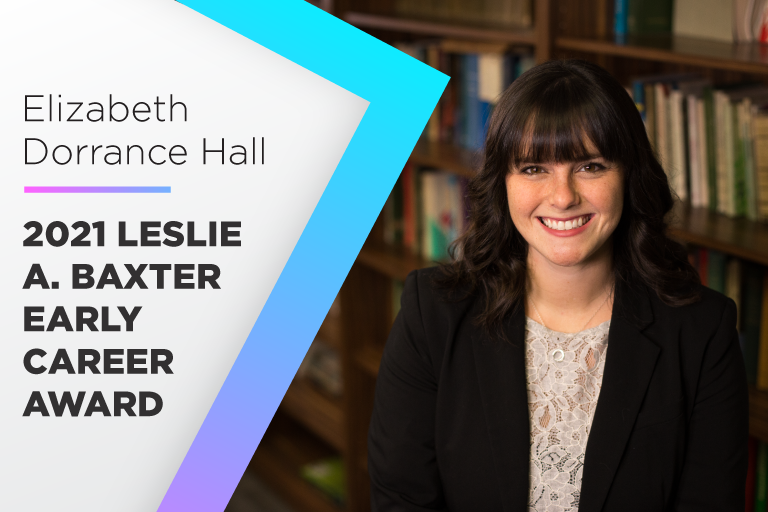Elizabeth Dorrance Hall is an assistant professor of communication, and director of the Family Communication and Relationships Lab at Michigan State University. She is currently on a Fulbright U.S. Scholar Award in Slovenia, and was recently named the 2021 National Communication Association Family Communication Division Early Career Award Scholar.
Dorrance Hall talks about her area of study, what it means to receive the Early Career Award and translating her research findings in such a way that helps people understand their relationships and each other.
Congratulations on being named the 2021 NCA Family Communication Division Early Career Award Scholar! What does it mean to you to win this award?
Thank you! I am honored to have won the Early Career Award this year. This particular Early Career Award is given based on productivity and strength of published work in family communication, especially work that addresses issues of diversity, equity, and/or inclusion. I am proud that my work on marginalization in families and the marginalization of women in traditionally male career fields has in a small way contributed to our understanding of diversity, equity, and inclusion. My work emphasizes that communication is the vehicle by which people are both othered and included – which means that with intent and care, what we say and how we say it has the power to spread acceptance and inclusion.
Could you explain your area of research and what you study?
My research focuses on relationship processes including marginalization and family communication dynamics. My research seeks to understand the pro-social and anti-social functions of family communication and is driven by two questions:
1. How can families and people in general communicate more effectively, especially when the topic of communication is difficult to manage?
2. How does family communication facilitate and hinder individual wellbeing?
A few specific examples of my work include studies aimed at understanding how marginalized family members enact resilience strategies to cope with difficult family relationships, how couples can most effectively communicate to encourage one another to engage in healthy behaviors (like eating more fruits and vegetables) without offending one another, and how families use communication to encourage members to seek mental healthcare when needed.
Your blog, Conscious Communication, on Psychology Today recently hit 1 million views. Congrats! Why do you think this blog resonates with so many people?
My main goal on Psychology Today is to translate research findings into easily accessible and digestible information. In my writing I sometimes relate research to my own life or a pressing societal issue like the COVID-19 stay-at-home orders. I believe that people fundamentally want to understand their relationships and one another. Websites like Psychology Today help bring useful information that has traditionally been housed in academic journals to people who can really use the insights to understand themselves and their social lives better. Some of my most popular articles are on topics such as “why family hurt is so painful,” “why conflict is healthy for relationships,” and “why we judge others.” These are fundamental relationship questions that decades of research can help people answer, as long as they have access to the research findings. My articles synthesize research findings around topics I think people will find interesting and helpful.
You’re currently on a Fulbright in Slovenia. Could you talk about the research you’re conducting there, and what you hope will come of that research?
In Slovenia it is quite common for multiple generations of adult family members to live in the same household. In addition, strong social programs provide low-cost childcare and generous parental leave. My research project for the Fulbright Award examines how Slovene families manage work-life balance and division of labor, communicate support, and coordinate their lives, especially for those living in multi-generational households (grandchildren-parents-grandparents) where the middle generation (parents) are both employed full time. I plan to compare findings in Slovenia with U.S. data where multigenerational living is much less common and less normative and the gender equality index (based on factors like the ratio of women in the workforce compared to men) is lower.
